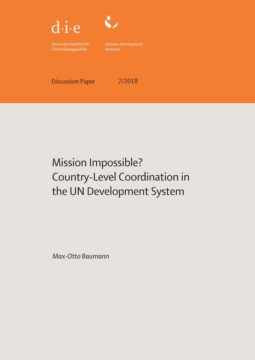With its, on average, 18 entities in every developing country, the United Nations (UN) faces an enormous challenge in coordinating its development activities. Under the 2030 Agenda and its complex set of Sustainable Development Goals, coordination has become even more urgent. The UN Secretary-General has recognised this and has made better coordination the main thrust of his reform proposals, which were presented earlier this year. This discussion paper aims to contribute to the ongoing debates and negotiations in New York with a snapshot of country-level coordination in the UN development system. It is based on an analysis of five developing countries and focusses specifically on the working-group level of coordination. The findings are not encouraging: Notwithstanding positive examples here and there, UN country-level coordination can still be characterised as a burdensome extra process with little practical consequence, rather than a way of working together for better results. To analyse these deficits, the paper looks at the incentive systems under which UN entities and their staff operate. It reconstructs how (a lack of) formal provisions, accountability, staff capacities and administrative harmonisation drive or impede coordination. Looking only at the UN itself would, however, miss an important part of the picture, as the UN operates under the mandates and the informal influence of member states. The paper therefore also analyses how member states shape UN country-level coordination through the formal mandates they issue in the General Assembly and the boards, the funding they provide and the ownership they exercise on UN development activities. The paper concludes by offering nine recommendations that complement the reform proposals advanced by the UN Secretary-General.
- Veröffentlicht am Donnerstag 14. November 2024 von Deutsches Institut f. Entwicklungspolitik
- ISBN: 9783960210634
- 48 Seiten
- Genre: Gesellschaft, Politik, Sachbücher, Wirtschaft
